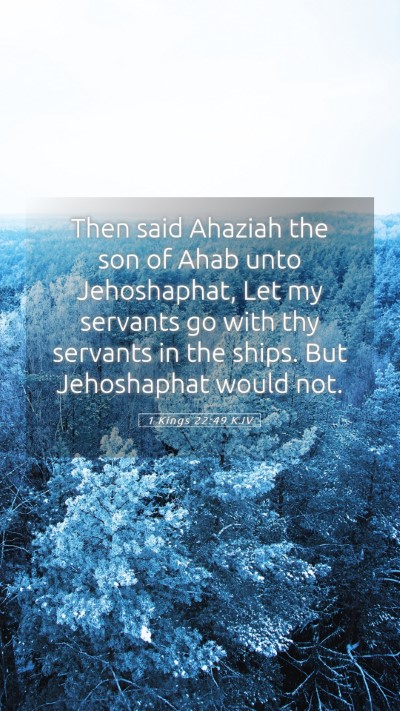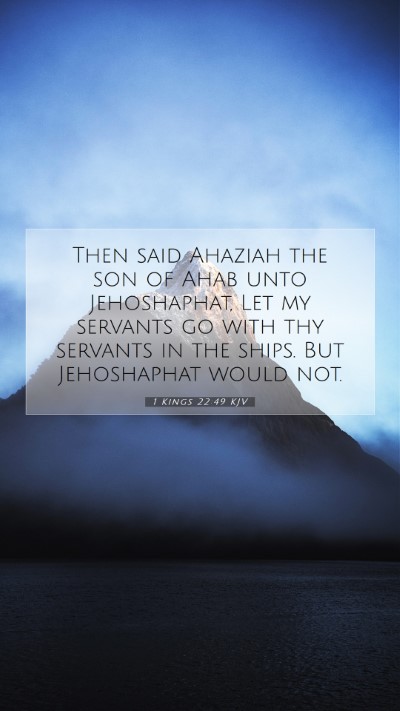Understanding 1 Kings 22:49
Verse: 1 Kings 22:49 - "And Jehoshaphat made ships of Tarshish to go to Ophir for gold: but they went not; for the ships were broken at Eziongeber."
This passage presents insights into both the actions of King Jehoshaphat and the overarching themes of reliance on God versus reliance on human endeavors. Commentators such as Matthew Henry, Albert Barnes, and Adam Clarke offer rich interpretations to deepen our understanding.
Meaning and Context
1. Historical Background: Jehoshaphat, king of Judah, demonstrates his ambition by attempting to establish trade relations and gather wealth through maritime ventures. His collaboration with the king of Israel, Ahab, reveals both political motivation and a desire for prosperity. However, biblical commentators stress the importance of divine favor in all undertakings.
- Jehoshaphat's Intent: Jehoshaphat sought to strengthen Judah's economy and perhaps his alliance with Israel. However, this initiative failed due to the ships breaking, which serves as a divine warning.
- Divine Intervention: The failure of the ships acts as a symbol of divine disfavor, indicating that Jehoshaphat’s plans were not aligned with God's will. This detail highlights the belief that success in life derives not merely from human effort but from divine approval.
Commentary Insights
Matthew Henry: Henry underscores the principle that while Jehoshaphat's intention may have been noble, his reliance on a secular alliance rather than seeking God’s counsel ultimately led to failure. He emphasizes that all endeavors should be aligned with God’s commands and purposes.
Albert Barnes: Barnes points out the geographical context of Eziongeber, a port on the Red Sea, symbolizing the limits of worldly wisdom. His commentary suggests that reliance upon military and economic strategies without piety can lead to disappointment.
Adam Clarke: Clarke delves into the symbolic meanings behind the broken ships, suggesting they represent the futility of human plans that disregard divine guidance. He indicates that the failure can also reflect on God’s judgment upon Israel's king Ahab and his alliances.
Theological Significance
This passage speaks volumes about the necessity of seeking God’s direction in every aspect of life, especially when making significant decisions. With practical applications in contemporary life, the verse invites believers to trust in God’s providence rather than merely in their own strength or wisdom.
- Trust and Obedience: The breakdown of Jehoshaphat’s plans serves as a reminder to believers about the importance of trusting God’s plans over our desires.
- Prayer and Guidance: It implies the need for prayerful discernment in one’s actions, particularly in decisions involving financial or relational stakes.
Cross References
- Proverbs 3:5-6: Trust in the Lord with all your heart, and do not lean on your own understanding.
- James 4:13-15: A caution against making plans without acknowledging God's will.
- 2 Chronicles 20:37: The prophecy concerning Jehoshaphat’s ships and the divine repercussions of his actions.
Conclusion
In summary, 1 Kings 22:49 offers profound teachings on the importance of aligning one's plans with God's will, emphasizing that true success is found in obedience and divine guidance. Scholars and readers alike are encouraged to reflect on their own decisions, seeking understanding through prayer and scripture analysis.
This exploration into the meaning of this Bible verse not only provides insights for individual contemplation but also serves as a valuable resource for Bible study groups, online Bible study sessions, and personal research into Scripture.
Reflective Questions:
- How do you seek God's direction when making important decisions?
- In what ways have you experienced the alignment of your plans with God's will?
- What practical steps can you take to ensure your efforts are in line with scripture?


